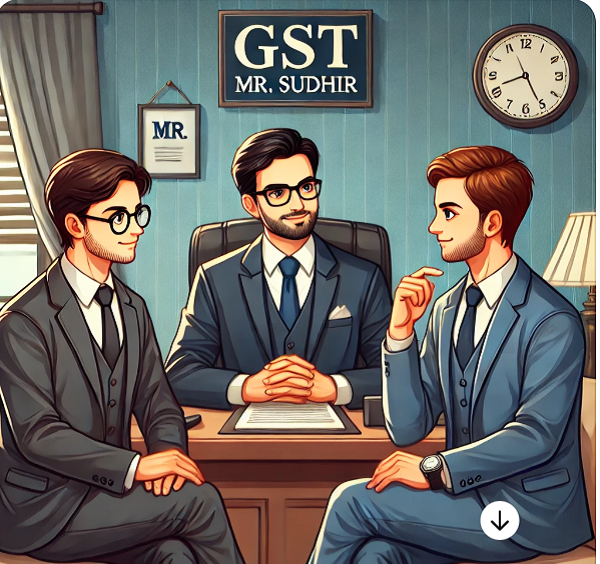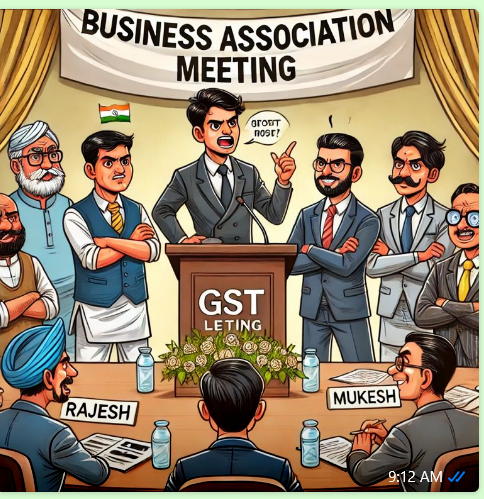Goods and Services Tax (GST) has revolutionized the tax system in India, aiming for a streamlined and unified structure. However, its implementation has not been without challenges, especially concerning Input Tax Credit (ITC). Dealers across the country face significant hurdles when their ITC is blocked, causing operational and financial strain. This article explores a fictional yet relatable scenario involving Mr. Rajesh, a dealer, his friend Mr. Mukesh, and their quest for clarity and resolution with the help of GST expert Mr. Sudhir Sir. The narrative highlights the issues, expert advice, and potential actions dealers can take to address ITC blockages.
CHARACTERS
1. Mr. Rajesh (One Dealer)
2. Mr. Mukesh (Rajesh’s Friend)
3. Mr. Sudhir Sir (GST Expert)
4. Mr. Sonu (Sudhir Sir’s Office Boy)
SCENE 1: MR. RAJESH’S OFFICE
(Rajesh is sitting in his office, worry lines clearly visible on his face as he looks at his GST ITC ledger.)
Mr. Rajesh (to himself) What has happened? Why has my ITC been debited? I’ve honestly paid GST to my vendor.

(Mr. Mukesh enters. He is a friend of Rajesh , very close)
Mr. Mukesh:- Hey Rajesh, what’s wrong? Why do you look so worried?
Mr. Rajesh:- (in a concerned voice) My ITC is blocked in my GST ledger. I can’t understand why.
Mr. Mukesh:- Let’s go to Sudhir Sir. He will surely help us.
SCENE 2: SUDHIR SIR’S OFFICE
(Mr. Rajesh and Mr. Mukesh enter Sudhir Sir’s office. Sudhir Sir is working at his desk. His office Boy Sonu is seen bringing tea and water.)
Sudhir Sir:- (smiling) Come in, Rajesh, Mukesh too. What’s the matter? It seems there’s some problem…
(Sonu, an assistant, enters the cabin.)

Sonu (placing tea and water) Sir, tea, and water.
Sudhir Sir:- Thank you. (to Rajesh and Mukesh) Sit down, have some tea first, then tell me what the problem is. You both seem quite worried…
Mr. Rajesh :- Yes sir, it’s a serious matter. My ITC is blocked. I’ve honestly paid GST to my vendor, I have the bill, the goods have been received, and payment has been made. Why has my ITC been blocked? It’s like breaking the legs of a running horse.
Sudhir Sir :- (seriously) Rajesh, this is a big problem these days. If your vendor is found non-existent or you haven’t received the goods, the Government can block your credit and recover it from you. Moreover, if your vendor hasn’t paid the tax on the goods sold to you, your input credit is blocked. This law itself is strange. If your vendor doesn’t file a return, you’re responsible; if he doesn’t pay tax, you’re responsible. Even though the Government has given him the license. Think about it, what authority do you have to make your vendor follow the law?
Mr. Rajesh:- (surprised and angry) This is wrong, sir. Why should I be punished for the vendor’s mistake? The Government should recover from the vendor, not impose double tax on me. I’ve honestly paid him the tax. Now it’s between the Government and the vendor. I can present the bill copy and bank account details, sir. I’ve paid him…
Sudhir Sir:- Yes, you’re right. This provision is not only wrong but also unjust to buyers like you. It’s baffling how the vendor becomes non-existent while the department registered him, took his statements, assessed his tax, and raised demand against him. All the national trade associations should protest against this and write to the Government to remove this strange provision. The Government listens if someone says it correctly.
The other issue is if the vendor doesn’t pay the tax, it’s the Government’s job to recover it from the vendor. What does the buyer have to do with it?
Mr. Rajesh:- (thinking) But sir, if no action is taken against the vendor, what can we do? How can we run our business?
Sudhir Sir (seriously):- It’s important that you keep complete information about your vendors and periodically confirm with them. Also, pressure the Government through trade associations and industry groups to change this provision.
Mr. Mukesh:- (worriedly) But still, my question remains, how can we do business in such a situation, sir?
Sudhir Sir:- Yes, it’s difficult. The Government should change this law and use its authority to collect tax from the vendor and provide relief to honest buyers. Meanwhile, you need to raise your voice with your trade association about how long and why buyers should suffer for vendors’ mistakes.
Mr. Rajesh:- (confused) And if we don’t get justice?
Sudhir Sir :- Then you should file a public interest litigation in the High Court and seek judicial intervention. It could be a long process, but we must strive for justice. Take help from your association for this.
SCENE 3: TRADE ASSOCIATION MEETING

(Mr. Rajesh, Mr. Mukesh, and other traders are having a meeting.)
President:- Friends, Mr. Rajesh, and Mr. Mukesh has explained the whole matter to me, and I have also taken guidance from Sudhir Sir over the phone. From today, we need to unite and oppose this unjust law. We should demand the Government to collect tax from the vendor and provide relief to honest traders. Today itself, I will talk to the national president and request him present this matter to the Finance ministry at the national level.
Mr. Rajesh:- Can we file a writ petition in the High Court for this entire provision instead of making individual appeals?
Another Trader:- What kind of provision is this, friends? After buying goods, we can never be sure if our input credit is safe or not. President Sir, please act quickly wherever needed. I think nothing can be done at the local level Now. Please try something at higher level.
All Traders:- (in unison) Yes, yes… Something concrete must be done.
President:- Yes, we will write to the Government and take further action wherever needed. We will discuss this seriously. The problem is becoming very serious.
All Traders:- Yes, president…
President:- One more thing that Sudhir Sir explained to me, which I fully understood, and we need to convey this to the Government too.
Mr. Rajesh:- What is this, president?
President:- Listen carefully, there’s a big logic in this. We also do business, and sometimes a buyer buys goods from us, and our agent takes the money from the buyer and runs away. Do we then recover the money from the buyer again, or can we? We also try to catch the agent. Similarly, tax collection is a commercial activity of the Government, and the dealer collecting tax is the Government’s agent. If he runs away with the Government’s tax or doesn’t deposit it, the Government should either recover the money from the agent or bear the loss itself. Why should an honest taxpayer who buys goods and pays in good faith be punished with double tax?
Conclusion : The issue of blocked ITC under GST highlights significant flaws in the current tax system, where honest buyers are penalized for the non-compliance of vendors. Through this narrative, it becomes evident that collective action through trade associations and legal recourse are potential pathways to resolving these issues. As dealers navigate these challenges, it is crucial for the Government to reassess and amend the provisions to ensure fairness and support the growth of businesses. By fostering a more just and supportive tax environment, the aim of GST as a unified and efficient tax system can be better realized.
Read this Article in Hindi :- जीएसटी इनपुट क्रेडिट -ईमानदार व्यापारी की मुश्किलें – कथा, पटकथा एवं संवाद






it is just like TDS on payments under the Income tax Act. Credit is given only after the tax deductor deposits the tax to govt account.